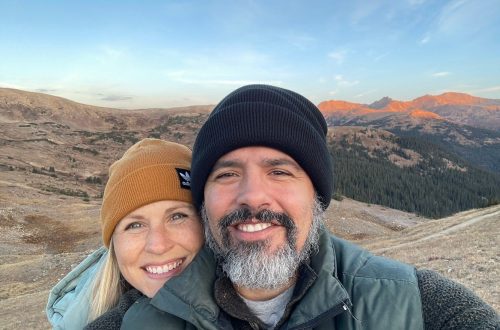
Your Trauma Response Might Be a Call to Transformation

We all have our coping mechanisms — some obvious, like alcohol, pornography, or doom-scrolling. Others are more socially acceptable, like perfectionism, people-pleasing, or the need to always be in control. But beneath the surface, these are often not just bad habits. They are trauma responses.
Our deepest wounds — whether from childhood, broken relationships, betrayals, or personal failures — leave a mark on our souls. Without realizing it, we spend our lives reacting to them, often running from pain rather than confronting it. But what if the very thing we fear — the suffering we avoid — is actually the doorway to transformation?
Jesus Knows, He Walked Through It
Modern psychology identifies four primary trauma responses: fight, flight, freeze, and fawn. These responses are not random; they are deeply ingrained survival mechanisms developed in response to suffering. And yet, in His Passion, Jesus experienced every single one of them.
In the Garden of Gethsemane, He felt overwhelming anguish, sweating blood in His distress. He longed for another way — yet He surrendered to the will of His Father. (Flight & Freeze)
At the pillar, He was scourged, brutally beaten, humiliated. He didn’t lash out. He didn’t beg for mercy. He bore it. (Fight & Fawn)
The crown of thorns was pressed into His skull, mocking His identity and worth. He remained silent. (Fawn & Freeze)
He carried His Cross, staggering under its weight, falling repeatedly — yet continuing toward Calvary. (All Responses)
On the Cross, He cried out, feeling abandoned, yet in the end, He entrusted Himself into the Father’s hands. (Freeze & Fawn)
Christ did not numb His suffering. He leaned into it. He transformed it. And through Him, we can do the same.
Your Trauma Response Is Keeping You Stuck
Maybe you’ve never thought about it this way, but take a moment to reflect:
When you feel hurt, ashamed, or overwhelmed , how do you respond?
Do you lash out in anger, unable to control your frustration? (Fight)
Do you avoid people and isolate yourself when pain comes? (Flight)
Do you become paralyzed by fear, unable to move forward? (Freeze)
Do you suppress your own needs to keep the peace, afraid of conflict? (Fawn)
These responses may have once protected you. But they are not where healing is found. Healing begins when we stop running and instead enter into our suffering, with Christ.
Christianity is not a self-help method.
Walking the Road of Healing With Christ
Christianity is not a self-help method. It is not about pulling ourselves up by our own strength. It is about union with Christ. In the early Church, believers were not content with simply knowing about Jesus. They sought to become like Him — even in suffering.
One of the most helpful ways Christians have done this is through meditating on the Sorrowful Mysteries, reflecting on Christ’s Passion not just as a historical event, but as a model for our own healing.
Here’s how you can begin:
1️ Agony in the Garden (Freeze & Flight) — When you feel overwhelmed with fear, like you can’t handle the weight of life, bring it to the Father. Sit in silence with Him. Let Him hold your pain. (Luke 22:44)
2️ Scourging at the Pillar (Fight & Fawn) — When you feel humiliated or worthless, remember that your identity is not in what has been done to you, nor in your ability to fight or please others. Your worth is in God alone. (John 19:1)
3️ Crowning with Thorns (Fawn & Freeze) — When you feel mocked, misunderstood, or belittled, recall Jesus’ silence. He did not let shame define Him. Neither should you. (Matthew 27:29–30)
4️ Carrying the Cross (All Responses: Fight, Flight, Freeze, Fawn) — When life feels unbearable, know that you are not meant to carry suffering alone. Accept help. Let others walk with you. (Luke 23:26)
5️ Crucifixion (Freeze & Fawn) — When you feel abandoned, remember that Jesus Himself cried out in desolation. Even when God feels distant, He is still present. Surrender yourself into His hands. (Matthew 27:46)
How to Meditate on These Mysteries
These moments in Christ’s Passion are not just stories — they are invitations. The Church has long used lectio divina (divine reading) and the Rosary to enter deeply into prayer. If you are new to this practice, try the following:
Read the Scripture passage slowly and prayerfully. Imagine yourself in the scene.
Ask yourself: Where do I see my own struggles in this moment?
Talk to Jesus about it. Let Him into your suffering.
End with surrender, asking for grace to respond as He did.
The Way Forward
Many believers today sense that something is missing in modern Christianity. The emotional highs of Sunday services fade. The self-help approach to faith leaves them weary. They hunger for something deeper, something ancient.
The early Church understood that discipleship is a long road, not a quick fix. Jesus Himself said that following Him means taking up our cross. The Church gave us tools — liturgy, daily prayer rhythms, fasting, and meditation — to help us live this out.
If you are searching for more than just motivational sermons — if you want to step into the depths of real transformation — consider integrating these ancient practices into your life. Because healing, real healing, doesn’t come from avoiding suffering. It comes from walking through it — with Christ.
The Sorrowful Mysteries: A Divine Office Reading & Meditation
Use this guide for structured prayer and reflection
Opening Prayer
O Lord, open my lips, and my mouth shall proclaim Your praise.
Psalm 51:10–12
Create in me a clean heart, O God,
and renew a right spirit within me.
Cast me not away from Your presence,
and take not Your Holy Spirit from me.
Restore to me the joy of Your salvation,
and uphold me with a willing spirit.
(Pause for silent recollection)
First Mystery: The Agony in the Garden
(Luke 22:39–46)
Scripture Reading:
“And being in anguish, He prayed more earnestly, and His sweat was like drops of blood falling to the ground.”
Reflection:
When we experience deep fear, anxiety, or uncertainty, we often freeze or flee from suffering. Jesus, too, faced overwhelming anguish, but instead of running, He brought His fear to the Father. His surrender shows us that our pain is not meant to be carried alone.
Prayer:
Lord Jesus, in Your agony, You taught us to surrender even when the weight of suffering seems unbearable. Strengthen me to kneel before the Father in my distress and trust in His will.
Meditation:
What fears do you carry in your heart?
Do you bring them to God or try to handle them alone?
Can you surrender, as Christ did, even when relief doesn’t come immediately?
(Pause for silent prayer)
You: Not my will, but Yours be done, O Lord.
— — — — — — — — — — — — — — — — — — — — — — — — — — — — — — — — — — — — — —
Second Mystery: The Scourging at the Pillar
(John 19:1)
Scripture Reading:
“Then Pilate took Jesus and had Him scourged.”
Reflection:
Jesus endured pain and humiliation, yet He did not retaliate. Many of us respond to wounds by either fighting back in anger or fawning to please others, hoping to escape further suffering. Christ’s silence and endurance remind us that our worth is not in the approval of others but in being beloved by God.
Prayer:
Lord Jesus, You bore stripes on Your back for our healing. Teach me to endure suffering with patience, knowing that my identity is not in how others treat me, but in Your love.
Meditation:
How do you respond to humiliation or rejection?
Do you seek validation from others rather than resting in God’s love?
Can you entrust your suffering to God instead of reacting out of fear?
(Pause for silent prayer)
You: By His wounds, we are healed.
— — — — — — — — — — — — — — — — — — — — — — — — — — — — — — — —
Third Mystery: The Crowning with Thorns
(Matthew 27:29–30)
Scripture Reading:
“And after twisting together a crown of thorns, they placed it on His head. They put a staff in His right hand and knelt in mockery before Him.”
Reflection:
Jesus was mocked, ridiculed, and stripped of dignity. Many of us experience shame — sometimes imposed by others, sometimes by our own failures. When we freeze in shame or try to win the favor of those who belittle us, we forget that our worth is in being sons and daughters of God.
Prayer:
Lord Jesus, mocked and crowned with thorns, remind me that my worth is not in the opinions of men, but in the love of the Father. Heal my heart from shame and help me stand in the truth of my identity in You.
Meditation:
Where in your life do you feel the sting of shame?
Are you tempted to let others define your worth?
Can you embrace the truth that your dignity comes from God alone?
(Pause for silent prayer)
You: The Lord is my light and my salvation; whom shall I fear?
— — — — — — — — — — — — — — — — — — — — — — — — — — — — — — —
Fourth Mystery: The Carrying of the Cross
(Luke 23:26)
Scripture Reading:
“As they led Him away, they seized Simon of Cyrene, who was on his way in from the country, and put the cross on him to carry behind Jesus.”
Reflection:
Jesus fell under the weight of His Cross. He experienced exhaustion and suffering yet continued onward. Sometimes, our response to suffering is avoidance or escape. Other times, we try to bear it all alone. But Christ teaches us that we must embrace our crosses while also allowing others to help us.
Prayer:
Lord Jesus, You bore the weight of our sins, yet You allowed Simon to help carry Your Cross. Teach me to embrace suffering, but also to receive the help and love of others.
Meditation:
What burdens are you carrying alone?
Have you resisted asking for help in suffering?
Can you embrace your cross rather than running from it?
(Pause for silent prayer)
You: Come to Me, all who are weary and burdened, and I will give you rest.
— — — — — — — — — — — — — — — — — — — — — — — — — — — — — — — — — — — — —
Fifth Mystery: The Crucifixion and Death of Jesus
(Matthew 27:45–50)
Scripture Reading:
“About the ninth hour, Jesus cried out in a loud voice, ‘My God, My God, why have You forsaken Me?’”
Reflection:
In the darkest moment, Jesus felt abandoned by the Father. Yet, His final act was one of surrender: “Father, into Your hands, I commit My spirit.” We, too, will experience seasons of silence, where God seems absent. But faith means trusting that even in the darkness, He is present.
Prayer:
Lord Jesus, in the silence of the Cross, You felt forsaken yet remained faithful. In my moments of doubt and suffering, help me to entrust myself completely to You.
Meditation:
Have you ever felt abandoned by God?
Do you trust that He is still with you even when He feels distant?
Are you willing to surrender yourself into His hands?
(Pause for silent prayer)
You: Into Your hands, O Lord, I commend my spirit, my desires, and my fears.
— — — — — — — — — — — — — — — — — — — — — — — — — — —
Closing Prayer
Lord Jesus Christ, You have walked the road of suffering before us. Teach us to embrace our crosses, to trust in the Father’s love, and to unite our wounds to Yours. May we find healing in Your Passion and strength to follow You in all things. Amen.





